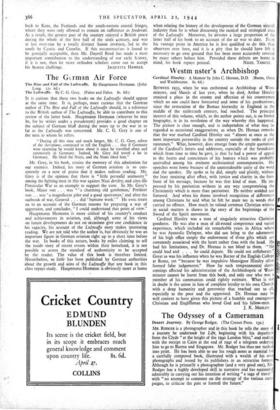Westm•nster's Archbishop
Cardinal Hinsley.. A Memoir by John C. Heenan, an. (Burns, Oates and Washbourne. 8s. 6d.) BETWEEN 1935, when he was enthroned as Archbishop of West- minster, and March of last year, when he died, Arthur Hinsley attained a place in the esteem and affection of his countrymen which no one could-have forecasted and none of his predecessors, since the restoration of the Roman hierarchy in England in the middle of the nineteenth century, had reached. The principal interest of this volume, which, as the author points out, is no formal biography, is in its revelation of the way whereby this happened. The picture is clear enough, and is independent of what may be regarded as occasional exaggerations, as when Dr. Heenan remarks that the war marked Cardinal Hinsley out " almost at once as the most important personality in the country outside the ranks of civil statesmen." What, however, does emerge from the ample quotations of the Cardinal's letters and addresses, especially of the broadcasts which from time to time he gave, is that he had a power of appeal to the hearts and consciences of his hearers 12 hich was probably unrivalled among his eminent ecclesiastical contemporaries. His speeches went home because of the unmistakeable unity of the word and the speaker. He spoke as he did, simply and plainly, without the least straining after effect, with justice and charity in the fore- front of his message, because he was that kind of man. He im- pressed by his patriotism without in any way compromising the Christianity which is more than patriotism. He neither scolded nor flattered. And when his theme involved recognition of differences among Christians he said what he felt he must say in words that carried no offence. How much he valued common Christian witness in social matters is shown in die story of .the beginnings of the Sword of the Spirit movement. . Cardinal Hinsley was a man of singularly attractive Christian goodness. He was also a man of all-round competence and varied experience, which included six remarkable years in Africa where he was Apostolic Delegate, who did not bring to the adornment of his high office simply the endowment of those gifts which are commonly associated with the heart rather than with the head. He, had his limitations, and Dr. Heenan is not blind to them. -"He could lead and . . . he could depute. He could not collaborate." Great as was his influence when he was. Rector of the English College at Rome, yet " because he was impulsive Monsignor Hinsley often formed false judgements." How far -such temperamental short- comings affected his administration of the Archbishopric of West- minster cannot be learnt from this book, and only one who was a member of his communion could rightly estimate. What is not in doubt is the union in him of complete loyalty. to his own Church with a deep humanity and generosity that reached out to all, especially to the poor and the oppressed. Dr. Heenan may be well content to have given this picture of a humble and courageous Christian and Engliglunan who loved God arid his fellow-men.
J. K. MOZLEY.


























 Previous page
Previous page